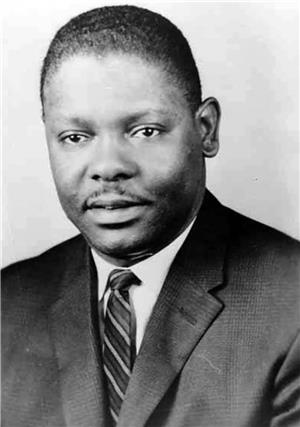Edwin T. Pratt was the Executive Director of the Seattle Urban League, a member of the Central Area Civil Rights Organization, and a leader in the struggle for integrated housing and education in Seattle.
On the snowy night of January 26, 1969, Edwin T. Pratt was shot and killed in the doorway of his home at 17916 1st Avenue NE in Shoreline by an unknown assailant. The city was shocked by the murder of this man whose voice was one of calm during the racial turmoil of the 1960s. Funeral services were held at St. Mark's Cathedral and his body is interred there.
Edwin Pratt lived in Seattle a little more than 12 years, yet his leadership in human and civil rights have left an imprint on the fabric of life in the city. A committed integrationist, he believed that the problems of race could only be solved through integrated efforts.
Housing discrimination and de facto segregated schools were in place when he arrived in Seattle in 1956. Through his leadership, the League grew from a staff of five to one of 25 and changes began to take place.
To ease segregation in schools, Edwin Pratt supported the Triad Plan, a proposal developed by an Urban League committee for reorganizing Seattle's elementary schools. The Triad Plan became a turning point and hallmark in the continuing struggle against de facto segregation and for quality multi-racial education. He also conducted quiet negotiations with the University of Washington, urging the school to improve minority opportunity.
In housing, he pushed for integrated neighborhoods and promoted Operation Equality, the League's fair housing listing service and sponsor of a federal program encouraging home ownership by low income families.
Edwin Pratt was born December 6, 1930, in Miami, Florida, attended Clark College in Atlanta, Georgia, and received his master's degree in Social Work from Atlanta University. He joined the Urban League and served in Cleveland and Kansas City before his appointment in 1956 as Community Relations Secretary of the Seattle Urban League. Five years later he became Executive Director.
In the late 1970s, the 5.5-acre park on E Yesler Way and 20th Avenue S and the Pratt Fine Arts Center at 1902 South Main Street were named in his honor.

